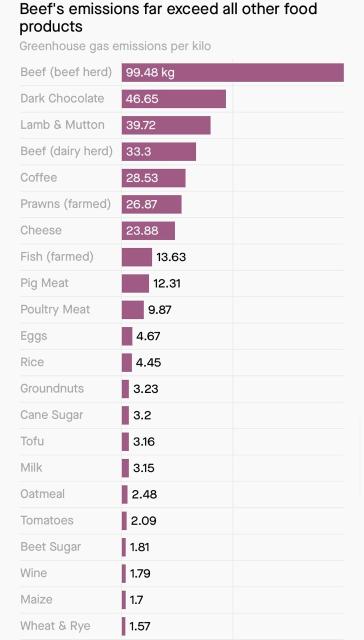Meat industry blocked the IPCC’s attempt to recommend a plant-based diet
“A leak of a draft of the Intergovernmental Panel on #ClimateChange (#IPCC) report..has been particularly enlightening when it comes to just how much how delegations negotiate, watered down & delete scientists’ findings.”
qz.com/ipcc-report-on-climate-… #science #food
The meat industry blocked the IPCC’s attempt to recommend a plant-based diet
A leaked draft revealed how the meat industry is obstructing efforts to curb climate changeAurora Almendral (Quartz)

MárciaW 🇸🇩
in reply to Sheril Kirshenbaum • • •Zolan Quobble
in reply to Sheril Kirshenbaum • • •Toot Engineer
in reply to Sheril Kirshenbaum • • •Stephanie Jane
in reply to Sheril Kirshenbaum • • •xenogon
in reply to Sheril Kirshenbaum • • •I feel simplistic comparisons like this are counterproductive.
It doesn't seem to take into account:
1. water content (A kilo of dry grain is a lot more food than a kilo of fresh veg, a kilo of cheese is a lot more food than a kilo of milk)
2. nutrient density and profile (a kilo of protein is more valuable than a kilo of carbs, some proteins are more valuable than others, also some fats are more healthy than others, also vitamin and mineral content)
3. variation in production methods. The same crop or animal can be grown in different ways with very differnt impacts. Is what is shown the industry standard (often worst) method? Or an average of all methods in use? What would the graphic look like if lowest carbon available methods were used and what non-carbon tradeoffs would apply?
Some people calculate that sheep meat is worse than beef. Is this feedlot beef or trad pastured beef or purely grass fed? Is it comparing feedlot beef with partially grass fed sheep?
4. Does it include packaging? Glass bottles and transport for wine for example add a
... show moreI feel simplistic comparisons like this are counterproductive.
It doesn't seem to take into account:
1. water content (A kilo of dry grain is a lot more food than a kilo of fresh veg, a kilo of cheese is a lot more food than a kilo of milk)
2. nutrient density and profile (a kilo of protein is more valuable than a kilo of carbs, some proteins are more valuable than others, also some fats are more healthy than others, also vitamin and mineral content)
3. variation in production methods. The same crop or animal can be grown in different ways with very differnt impacts. Is what is shown the industry standard (often worst) method? Or an average of all methods in use? What would the graphic look like if lowest carbon available methods were used and what non-carbon tradeoffs would apply?
Some people calculate that sheep meat is worse than beef. Is this feedlot beef or trad pastured beef or purely grass fed? Is it comparing feedlot beef with partially grass fed sheep?
4. Does it include packaging? Glass bottles and transport for wine for example add a lot on top of the basic cost of production.
It's weird that no green veg are listed. We do actually need to eat those. (but cf #3 & gas heated hothouses!)
Put all this together and it's so simplistic and challengeable that I don't feel it helps the case.
I already know that oats, soy and peanuts are amongst the best staples - but you have to have a lot of external knowledge to get that from this.
dr 🛠️🛰️📡🎧
in reply to Sheril Kirshenbaum • • •Looks like if we even just recommended a non-ruminant-based meat diet would be doing a lot better.
Weird how running billions of tiny methane factories all over the world is creating greenhouse gasses.
Animal Lover
in reply to Sheril Kirshenbaum • • •This is why we are doomed.
Greed/ignorance/politics/normalcy bias
Kévin
in reply to Sheril Kirshenbaum • • •C.S.Strowbridge
in reply to Sheril Kirshenbaum • • •NotReadyForThis
in reply to Sheril Kirshenbaum • • •greenPAl00ka 🏳🌈
in reply to Sheril Kirshenbaum • • •MikeZilla Minus One
in reply to Sheril Kirshenbaum • • •Rpsu (326 ppm)
in reply to Sheril Kirshenbaum • • •Chris Wood
in reply to Sheril Kirshenbaum • • •for anyone who’s interested, the book “Regenesis” by George Monbiot examines many different ways to produce food and many diets touted to be better for the environment and reports how feasible they all are.
Food production and climate change can be polarised topics. So here’s a gentle reminder to be wary of who you’re getting your information from and what their motives are.
The New Scientist sums up “Regenesis” nicely: newscientist.com/article/mg254…
Regenesis review: Farming is killing the planet but we can stop it
Rowan Hooper (New Scientist)legraLeGra
in reply to Sheril Kirshenbaum • • •@xris
These top GHG emitters are rather fascinating.
Chocolate emissions are not limited to the dairy piece, Land Use Change is a huge part of its outsized impact.
“global warming potential [of chocolates] are very sensitive to land-use change associated with cocoa production, increasing the impact of chocolate products by a three to four times if LUC is involved.”
pure.manchester.ac.uk/ws/files…
Of course, pastures have been cleared for millennia, too. Need to dig in to LULC literature.
Martin Rundkvist
in reply to Sheril Kirshenbaum • • •Molly Cantrell-Kraig 🍷
in reply to Sheril Kirshenbaum • • •It’s infuriating.
#climate #vegan #plantBased #greed #ClimateChange
Kris Samsel
in reply to Sheril Kirshenbaum • • •Formerly disgruntled in Oregon
in reply to Sheril Kirshenbaum • • •Dave Volek
in reply to Sheril Kirshenbaum • • •If this data is regarded as correct, then our systems of government should be directing us away from beef consumption. But these systems seem incapable of such social movement. It's time for a new way.
#tiereddemocraticgovernance
Gau
in reply to Sheril Kirshenbaum • • •stevenray
in reply to Sheril Kirshenbaum • • •. stdh .
in reply to Sheril Kirshenbaum • • •#Coffee is also a lot more than expected. Maybe I should ask my employer to give us #wine instead. Should be interesting...
Jokes aside, this is another example of the awful cynicism that seems to rule most of the world.
Jonathan
in reply to Sheril Kirshenbaum • • •Ged|Net
in reply to Sheril Kirshenbaum • • •Steven 📸
in reply to Sheril Kirshenbaum • • •Sheril Kirshenbaum
in reply to Steven 📸 • • •Steven 📸
in reply to Sheril Kirshenbaum • • •Earthworm 🐌
in reply to Sheril Kirshenbaum • • •@sdosremedios
Although local food does not mean always lower emissions (take e.g. fossil fuel heated greenhouses growing tomatoes in winter), there is an important effect that is overlooked when only taking the direct measurable emissions into account.
-> the degree of direct relation to production and community control over the food system
When it is local, you can go to visit the farmer, build trust, come to an agreement with them, build trust on the basis of mutual interests and facilitate direct marketing channels. Plus, you can push for reasonable agricultural policies on the regional level etc.
With global supply chains this is simply not possible. You need giant, inefficient, expensive bureaucratic mechanisms to influence food production systems on the other side of the world.
... show moreWith market incentivizing fraud, distrust makes you even think that blockchain or other tech-fixes could be necessary because the system builds on distrust.
Local f
@sdosremedios
Although local food does not mean always lower emissions (take e.g. fossil fuel heated greenhouses growing tomatoes in winter), there is an important effect that is overlooked when only taking the direct measurable emissions into account.
-> the degree of direct relation to production and community control over the food system
When it is local, you can go to visit the farmer, build trust, come to an agreement with them, build trust on the basis of mutual interests and facilitate direct marketing channels. Plus, you can push for reasonable agricultural policies on the regional level etc.
With global supply chains this is simply not possible. You need giant, inefficient, expensive bureaucratic mechanisms to influence food production systems on the other side of the world.
With market incentivizing fraud, distrust makes you even think that blockchain or other tech-fixes could be necessary because the system builds on distrust.
Local food systems limit the possibilities of agribusiness lobbying.
This is the real added value of buying local. You become responsible of what happens in your backyard. If you don't care, at least it'll be your own local environment that gives you feedback of your poor choices.
Local rules🧑🌾
Cykonot
in reply to Sheril Kirshenbaum • • •being vegan has gotten a lot more convenient and a bit more affordable. Basically relearning to cook sorta sucks but I mean I guess it's "fun"
If animal agriculture wasn't massively subsidized, (plant-based) food would be cheaper. Land would be cheaper, too
Johan 🚴🧗🏃
in reply to Sheril Kirshenbaum • • •Sonictroubadour
in reply to Sheril Kirshenbaum • • •josh buermann
in reply to Sheril Kirshenbaum • • •Olof-Knight
in reply to Sheril Kirshenbaum • • •Doctor LURK
in reply to Sheril Kirshenbaum • • •This is good to be reminded of! It's why we only eat beef 2-3x / year. But I hope nobody reading this misses that it's part of a larger issue:
In 2020, assuming the beef cattle rate in the graphic, all the beef we ate worldwide produced just shy of 6 million metric tons of emissions. The same year, a single energy company, Vistra Energy, produced over 95 million tons.* _Corporations_ must also be held to account! It's not all (or even mostly) consumers' fault.
* peri.umass.edu/greenhouse-100-…
Greenhouse 100 Polluters Index: (2022 Report, Based on 2020 Data)
PERIBen Anderson
in reply to Sheril Kirshenbaum • • •Graham Palmer
in reply to Sheril Kirshenbaum • • •Erwin Rossen 🔸
in reply to Sheril Kirshenbaum • • •Elizabeth
in reply to Sheril Kirshenbaum • • •Mark
in reply to Sheril Kirshenbaum • • •LiverpoolWiz
in reply to Sheril Kirshenbaum • • •Ryan DeShone
in reply to Sheril Kirshenbaum • • •